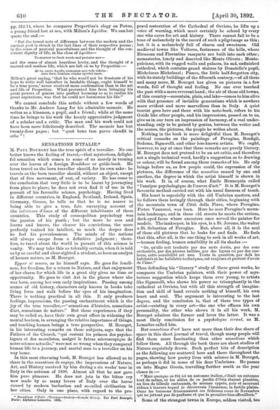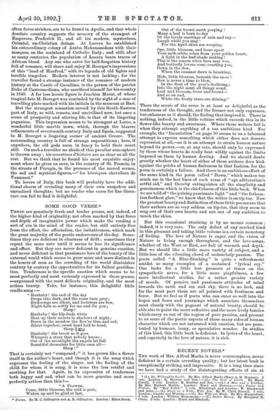SENSATIONS D'ITALIE.*
M. PAUL BOURGET has the true spirit of a traveller. No one better knows the feeling of travel,—that mysterious, delight- ful sensation which comes to some of us merely in turning over the leaves of a foreign Bradshaw or guide-book. He loves travel as the born traveller should, for its own sake : he travels as the born traveller should, without an object, except that of free movement, of rest, of variety. He has come to the conclusion that very little is to be learnt by journeying from place to place; he does not even find it of use in the pursuit of his favourite science, psychology. Having lived in different countries, in England, Scotland, Ireland, Spain, Germany, Greece, he tells us that he is no nearer to being able to give a true, fair, unvarying acconnt of the interieurs d'd rues of the different inhabitants of these countries. This study of cosmopolitan psychology was the passion of his youth ; but the more he sees and learns and knows, the clearer his convictions, the more perfectly trained his intellect, so much the deeper does he feel his powerlessness. The minds of the nations will always escape from a definitive judgment ; there- fore, to travel about the world in pursuit of this science is vanity. We may take this as tolerably certain, when it is told us by so careful and clear-sighted a student, so keen an analyst of human nature, as M. Bourget.
Eppur si muove, as he himself says. He goes for loneli- ness, for freedom, for a return to Nature, and that enjoyment of her charm for which life in a great city gives no time or opportunity. He goes to visit Art in the places where she was born, among her own early inspirations. Passing among scenes of old history, characters only known in books take living form and walk before the eyes of his imagination. There is nothing practical in all this. It only produces feelings, impressions, the passing enchantment which is the joy of the true traveller,—" sensations d'histoire, sensations d'art, sensations de nature." But these experiences, if they may be called so, have their own great effect in widening the mental horizon, in arranging the relative importance of things, and teaching human beings a true perspective. M. Bourget, in his interesting remarks on these subjects, says that the Fathers of the Church, "qui restent les princes des psycho- logues et des moralistes, malgr4 le fatras microscopique de notre science actuelle," were not so wrong when they compared human life to a journey, and mortal man to a traveller on his way home.
In this most charming book, M. Bourget has allowed us to share in the sensations de voyage, the impressions of Nature, Art, and History received by him during a six weeks' tour in Italy in the autumn of 1890. Almost all that he saw gave him pure pleasure. He does not join in the bitter cry now made by so many lovers of Italy- over the havoc caused by modern barbarism and so-called civilisation in her cities. Only in one place, with regard to the pro.
• Sensations d'Italie (Toscana—Ombrie—Grande Greco). Par Paul Bourget. - Paris: Alphonse Lemerre. 1891.
posed restoration of the Cathedral of Orvieto, he lif ta up a voice of warning, which must certainly be echoed by every one who cares for art and history. There cannot fail to be a tone of melancholy in the record of such a pilgrimage as this ; but it is a melancholy full of charm and sweetness. Old mediaeval towns like Volterra, fastnesses of the hills, where Etruscan and Florentine ramparts are built into each other; monasteries, lonely and deserted like Monte Oliveto ; Monte- pulciano, with its rugged walls and palaces, its sad, unfinished cathedral, which contains grand statues by Donatello's pupil, Michelozzo Michelozzi; Pienza, the little half-forgotten city, with its stately buildings of the fifteenth century,--of all these and many more, M. Bourget has given us pictures in a few words, full of thought and feeling. No one ever touched the past with a more reverent hand ; the air of these old towns, of this country—mountain, plain, and lake—comes to him alive with that presence of invisible generations which is nowhere more evident and more marvellous than in Italy. A quiet tourist goes here and there with his note-book, refers to his Guide like other people, and his impressions, passed on to us,
give us in our turn an impression of harmony, of a real under- standing, only to be gained by genius, between the writer and
the scenes, the pictures, the people he writes about.
Nothing in the book is more delightful than M. Bourget's critical remarks on the paintings of Perugino, Bonfigli, Sodoma, Signorelli, and other less-known artists. We ought, however, to say at once that these remarks are purely literary. M. Bourget does not pretend to be an art-critic, and therefore not a single technical word, hardly a suggestion as to drawing or colour, will be found among these remarks of his. He only brings before us, as few people could, the expression of the
pictures, the difference of the sensation caused by one and another, the degree in which the artist himself is shown in his work. It is, of course, what Emile Hennequin called
" l'analyse psychologique de rceuvre d'art." It is M. Bourget's favourite method carried out with his usual fineness of touch. His heart is especially with the old Umbrian masters, and he follows them lovingly through their cities, beginning with the mountain town of Cita della Pieve, where Perugino, Pietro Vannueci, was born. Here he sees Perugino's moun- tain landscape, and in these old streets he meets the serious, dark-eyed faces whose ancestors once served the painter for models. The innkeeper, in his eyes, is a St. Jerome, the waiter a St. Sebastian of Perugino. But, above all, it is the soul of these old pictures that he looks for and finds. He feels that this, after all, is the one thing to seek in all works of art, —human feeling, human sensibility in all its shades :- " Or, qu'elle soit traduite par des mots ecrits, par des sons orchestras, par des pierres tailless, par des lignes ou par des con- leurs, eette sensibility est sine. Touts la question, par del les habiletes et les habiletk techniques, est toujours et partout d'avoir de rime."
Thus-defending his " literary " study of these great works, he compares the Umbrian painters, with their power of mys-
terious suggestion which keeps them ever young, to artists like Signorelli, who shows his power so triumphantly in the
cathedral at Orvieto, but with all this strength of imagina- tion and skill of hand reveals nothing of himself, his own heart and soul. The argument is interesting to the last degree, and the conclusion is, that of these two types of artist—existing in every art—the one who effaces his own personality, the other who shows it in all his work, M. Bourget admires the former and loves the latter. It was a most likely conclusion for a psychologue errant, as M.
Lemattre called him.
But-sensations d'art have not more than their due share of space in this short journal of travel, though many people will find them more fascinating than other sensations which follow them. All through the book there are short studies of Nature exquisitely drawn. Such perfect bits of description
as the following are scattered here and there throughout the pages, showing how poetry lives with science in M. Bourget, as perhaps it did in some of his dear Umbrians. He passes on into Magna Grecia, travelling further south as the year closes in :- " Male quoique ce fitt ici un automne italien, automne tout de merle, at les allies de ce jardin d'Oria etaient plantees, an lieu de tilleuls embaumfe, de mornes cypres, noir et mouvant rideau e travers lequel je decouvrais l'immense, la fertile plains. Dana les buissons frissonnaient ces frileuses roses de Novembre qui ne jettent pas de perfume et que Is premiere bile effeuillera."
Sonie of the strangest towns in Europe, seldom visited, too often fever-stricken, are to be found in Apulia, and that whole desolate country suggests the memory of the strangest of Emperors, Frederick II., and all his modern, mysterious, Oriental, un-Christian doings. At Lucera he established his extraordinary colony of Arabs, Mahommedans with their mosques, on the mainland of Catholic Italy ; and still, after so many centuries, the population of Lucera, bears traces of African blood. Any one who cares for half-forgotten history fall of romance, will share and enjoy M. Bourget's impressions of this "land of Manfred," with its legends of old fights and terrible tragedies. Modern interest is not lacking; for the traveller found a strange instance of the romance of modem history at the Castle of Cavallino, in the person of the patriot Duke'of Castromediano, who sacrificed himself for his country in 1848. A far less heroic figure is Joachim Murat, of whose tragical fate M. Bourget was reminded by the sight of a case of travelling plate marked with his initials in the museum at Bari.
But the strangest sensation caused by this South-Eastern part of Italy, so wild, remote, and uncivilised now, but once a scene of prosperity and stirring life, is that of its lingering paganism. This impression seems to be strongest at Lecce, a wonderful little marble town, which, through the bizarre refinements of seventeenth-century Italy and Spain, suggested to M. Bourget a lingering corner of ancient Greece. The surrounding country is full of strange superstitions ; here, if anywhere, the old gods seem in fancy to hold their court still. On such a traveller no shade of this peculiar atmosphere is thrown away ; his sensations d'histoire are as clear as all the rest. But we think that he found his most exquisite enjoy- ment where he gives us ours, in the country of St. Francis, in the streets of Perugia, in the presence of the sacred scenes, the sad and mystical figures,—" les herdiques chevaliers de Vannucci."
To lovers of Italy, this book will probably have the addi- tional charm of revealing many of their own unspoken and unrealised thoughts; but no reader who cares for fine litera- ture can fail to find it delightful.



















































 Previous page
Previous page